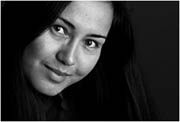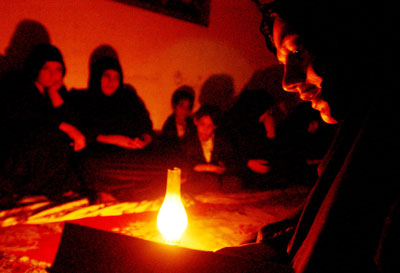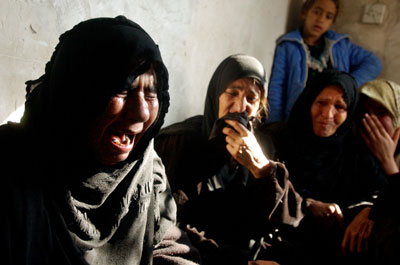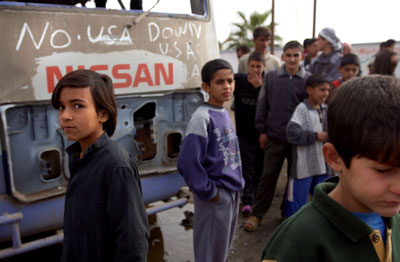 |
 |
Greetings from Baghdad
December 2003
|
 |
|||||||||
|
Dear Family and Friends, Their bright intelligent eyes were studying me, their stained white robes blending in with the dirty fingerprints on the walls. Midnight had come and gone. one... two, three and four o'clock in the morning. It was dark for miles around and we were huddled in Kadhamiya Hospital, a beacon of safety in a city where gangs of criminals for months have been perfecting the art of ambushing unwary victims. It wasn't always this way. Certainly not during the time of Saddam, Iraqis explain with much hand gesticulation. We were huddled in a bright florescent-lit room. And this time, I was again a journalist from the Philippines. Yesterday I was in Najaf, one of the holiest cities in Iraq for the Shia Muslims, and my translator decided I was Azerbaijani. Each day he gets more and more creative. When I wake up in the mornings, I never know who I will be that day. "Where are you from?" asks one of the doctors. I look at my translator inquisitively. "Where am I from, Saleem?" "You are from the Philippines, of course," he says with conviction.
Hours have passed and the doctors are supposed to be sleeping during their night rotation, but they find the presence of a journalist a welcome respite from their daily routine so they keep me company during my overnight vigil waiting for possible victims of violence. But the only patients that come in are women in large, black billowing "abbayas" with pain etched on every inch of their faces. They are in labor and the doctors cannot be bothered to get up, instead they are waved on to the third floor, the obstetrics department, which has one female doctor for most of the night. The obstetrics department handles on average 30 births per day. Once the women are dilated, they have about 20 minutes to give birth before the next woman is shuffled onto the birthing table. A gloved hand and a pair of scissors expedite the process.
So when Dr. Esam blew the whistle on the director of Kadhamiya hospital after the war, he was offered a nice car and $20,000 to shut up. It was a sum that would take him 15 years to earn on the salary of a doctor. He declined and instead led a rebellion to oust the former Baathist—and succeeded. He didn't consider this particularly heroic in light of the fact that he had stayed in the hospital at the height of the war and fought off looters for several days. It's mainly because of his efforts that Kadhamiya Hospital is one of the better hospitals in Baghdad today. "Don't trust anyone," whispered Saleem, "not even my brother, the doctor." But the doctors are on to me and they are educated enough to know that my Patagonia fleece top is probably not from the Philippines, my manner is not quite of the far east and my American accent comes too easily. I don't like this business of half-truths. But in Iraq today, it is a matter of life and death. When asked, all the other photographers from the U.S. who are working in Iraq just laugh and say they haven't been an American in months.
"Ah, what is this democracy," screams my driver bitterly as we nearly collide with yet another car driving in the wrong direction. I've given up on gasping every time we have a near fatality because I can't stand the exhaust that gets sucked into my lungs from the thousands of vehicles vying for every inch of space on the road. Most vehicles spewing fumes here were made in the 1970's and 80's before the sanctions were imposed on Iraq, halting the country's progress for the last two decades. Should Iraq have a democracy or a dictator? That is the question I posed to the doctors. Iraqis insist that they don't want a dictator. But a democracy will never work in Iraq either, they say. Because Iraqis are verrhy, verrhy different, they say with bushy eyebrows flickering with much meaning that I'm not sure I grasp. How so? I ask, hoping to be enlightened. Years of war have damaged the Iraqis, the doctors say. You can see it clearly in the children who will welcome a foreigner one moment and throw stones the next. There is a deep and odd violence that characterizes the people. The lack of motivation and laziness is tantamount to a national illness. It will take several generations for this to change, they say. Iraqis say they need a blend of democracy and dictatorship because the people are too uneducated to make decisions for themselves. They don't know the meaning of democracy. To illustrate their point, they tell me a story. A woman was interviewed by a prominent television network. "Do you think Iraq should have a democracy, voting for a new president every four years?" "Yes, democracy is great," she replies. "We could loot every four years." I understand well the doctors' complaints because I have lived them these past ten days in Baghdad. It is a verrhy, verrhy strange place. One of the patients I met in the hospital that night was Mohannad Hamid, 22. I only sort of met him because he was actually under a blanket with only a leg sticking out wrapped in bloody gauze. He was comatose, drugged with Valium and still had a bullet lodged in his leg because it was Eid and the surgeons were on vacation. "Such bad luck to be shot during Eid," my translator remarked. I fear that he might loose a leg because gangrene will develop in the bullet wound. Mr. Hamid was shot by his cousin, Omar, who was sleeping on the floor next to him. Omar explained that Mr. Hamid was being very bad. He had killed a man, looted and robbed. Mr. Hamid's family is financially comfortable; they own four cars. The problem is that all his criminal activity reflects badly on the family, and in a tribal society this could bring some nasty results if a victim's family decided to exact revenge on Mr. Hamid's family. So the family decided that in order to save the family honor, Mr. Hamid should be killed. Omar, a policeman, was designated to do the job. But Omar decided to shoot him in the leg instead because killing is prohibited by Allah, he said. And so now he watches over his cousin, hoping it will be a lengthy recuperation. Eventually, the doctors caught on to me and I let Saleem weave the final touches to the tale of my identity. It's great to be back in Baghdad. Love, Cheryl
© Cheryl Diaz Meyer
Dallas Morning News
|
||||||||||
|
Write a Letter to the Editor
Join our Mailing List
© The Digital Journalist
|


